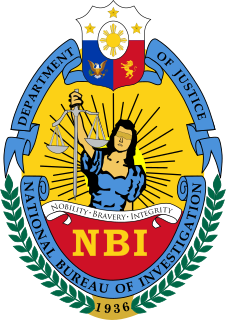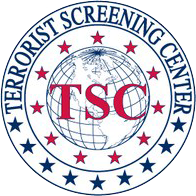Related Research Articles

The Federal Bureau of Investigation (FBI) is the domestic intelligence and security service of the United States and its principal federal law enforcement agency. Operating under the jurisdiction of the United States Department of Justice, the FBI is also a member of the U.S. Intelligence Community and reports to both the Attorney General and the Director of National Intelligence. A leading U.S. counter-terrorism, counterintelligence, and criminal investigative organization, the FBI has jurisdiction over violations of more than 200 categories of federal crimes.

The Counterterrorism Division (CTD) is a division of the National Security Branch of the Federal Bureau of Investigation. CTD investigates terrorist threats inside the United States, provides information on terrorists outside the country, and tracks known terrorists worldwide. In the wake of the September 11, 2001 attacks, CTD's funding and manpower have significantly increased.

The United States Naval Criminal Investigative Service (NCIS) is the primary law enforcement agency of the U.S. Department of the Navy. Its primary function is to investigate criminal activities involving the U.S. Navy and U.S. Marine Corps, though its broad mandate includes national security, counterintelligence, counter-terrorism, cyber warfare, and the protection of U.S. naval assets worldwide. The agency acts as internal affairs for the U.S Navy. NCIS is the successor organization to the former Naval Investigative Service (NIS), which was established by the Office of Naval Intelligence after the Second World War.

The National Security Branch (NSB) is a service within the Federal Bureau of Investigation. The NSB is responsible for protecting the United States from weapons of mass destruction, acts of terrorism, and foreign intelligence operations and espionage. The NSB accomplishes its mission by investigating national security threats, providing information and analysis to other law enforcement agencies, and developing capabilities to keep the US nation secure.

The National Bureau of Investigation is an agency of the Philippine government under the Department of Justice, responsible for handling and solving major high-profile cases that are in the interest of the nation.

The director of the Federal Bureau of Investigation is the head of the Federal Bureau of Investigation, the United States' primary federal law enforcement agency, and is responsible for its day-to-day operations. The FBI Director is appointed for a single 10-year term by the President of the United States and confirmed by the Senate. The FBI is an agency within the Department of Justice (DOJ), and thus the Director reports to the Attorney General of the United States.

The Terrorist Screening Center (TSC) is a division of the National Security Branch of the Federal Bureau of Investigation. It is the duty of the TSC to identify suspected or potential terrorists. Though housed within the FBI, the TSC is a multi-agency organization, including representatives from the United States Department of Justice, the United States Department of State, the United States Department of Homeland Security, the United States Department of Defense, the United States Postal Service, and various private contractors. It is located in Vienna, Virginia, near Virginia State Route 123.
The California Department of Justice is a statewide investigative law enforcement agency and legal department of the California executive branch under the elected leadership of the California Attorney General (AG) which carries out complex criminal and civil investigations, prosecutions, and other legal services throughout the US state of California. The Department is equivalent to the State Bureau of Investigation in other states.
Joseph M. Demarest, Jr. is an associate executive assistant director of the Federal Bureau of Investigation (FBI), and was formerly the assistant director in charge of the FBI's cyber division. He is responsible for the FBI's operations to protect the United States from cyber-based national security threats.
The Communications Exploitation Section (CXS), established in December 2002, is an office of the Operations II branch of the FBI Counterterrorism Division, which is tasked with analyzing captured communications data to identify and monitor "terrorist" networks.
The Criminal, Cyber, Response, and Services Branch (CCRSB) is a service within the Federal Bureau of Investigation (FBI). The CCRSB is responsible for investigating financial crime, white-collar crime, violent crime, organized crime, public corruption, violations of individual civil rights, and drug-related crime. In addition, the Branch also oversees all computer-based crime related to counterterrorism, counterintelligence, and criminal threats against the United States.

The Science and Technology Branch (STB) is service within the Federal Bureau of Investigation that comprises three separate divisions and three program offices. The goal when it was founded in July 2006 was to centralize the leadership and management of the three divisions. The mission of the STB is discover, develop, and deliver innovative science and technology so that intelligence and innovative investigation is enhanced.

The Information and Technology Branch (ITB) is a service within the Federal Bureau of Investigation. The ITB is responsible for all FBI information technology needs and information management. ITB also promotes and facilitates the creation, sharing, and application of FBI knowledge products with the larger law enforcement community in order to improve overall nationwide crime fighting effectiveness.

The Counterintelligence Division (CD) is a division of the National Security Branch of the Federal Bureau of Investigation. The division protects the United States against foreign intelligence operations and espionage. It accomplishes its mission of hunting spies and preventing espionage through the use of investigation and interaction with local law enforcement and other members of the United States Intelligence Community. In the wake of the September 11, 2001 attacks, the division's funding and manpower have significantly increased.

The Intelligence Branch (IB) division of the Federal Bureau of Investigation (FBI) handles all intelligence functions, including information sharing policies and intelligence analysis for national security, homeland security, and law enforcement purposes. The IB operates through the use of embedded intelligence strategies.

The Weapons of Mass Destruction Directorate (WMDD) is a division of the National Security Branch of the Federal Bureau of Investigation. WMDD addresses and investigates emerging threats the United States faces from the use of weapons of mass destruction. WMDD specifically consolidates all relevant FBI assets under one comprehensive program capable of detecting, deterring, and dismantling WMD programs. In the wake of the September 11, 2001 attacks, the Division's funding and manpower have significantly increased.

The Criminal Investigative Division (CID) is a division within the Criminal, Cyber, Response, and Services Branch of the Federal Bureau of Investigation. The CID is the primary component within the FBI responsible for overseeing FBI investigations of traditional crimes such as narcotics trafficking and violent crime.

Sean M. Joyce was the 14th Deputy Director of the Federal Bureau of Investigation.

Mark F. Giuliano is an American law enforcement official who served as the 15th Deputy Director of the Federal Bureau of Investigation from December 1, 2013, until his retirement from the FBI on February 1, 2016.
References
- 1 2 "Leadership & Structure". Federal Bureau of Investigation . Retrieved August 16, 2022.
- ↑ FBI National Press Office
